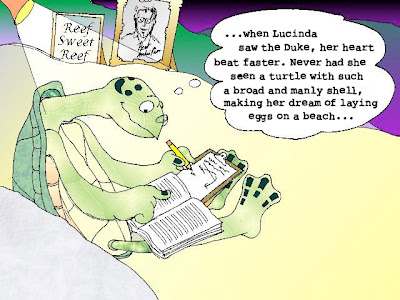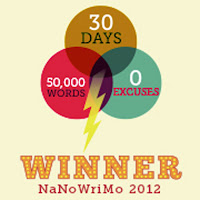- by Tara Maya
Update on #NaNoWriMo 30: What To Do After #NaNoWriMo
In the spirit of NaNoWriMo, I pulled an all-nighter to finish my 50,000 words. The question is what do you do after NaNoWriMo? Of course, that depends on the state of your novel.
If you did not finish:
1. Do not stop cold.
Let’s say that it’s midnight on Nov 30, or dawn on Dec. 1 and you have just one or two chapters left… or maybe even the last third of the book. But NaNoWriMo ends, and you think, “Damn, I didn’t win,” so you give up, stop cold. Or perhaps you “won” … you passed 50,000 words… but on an 80,000 word book, that means you’re still 30,000 words short of finishing.
Do not stop writing!
Here’s Robert Chazz Chute shares his experience with this and warns others not to make the same mistake:
It’s okay to paste in the broad strokes to fill in later (e.g. “insert awesome sex scene here” or “this is the chapter where little Bobby discovers he can crush badger skulls with the power of his mind.”) However, as I reached 50,000 words, I stopped short. I didn’t write the last scene before typing “The End”. Later, when I returned to my manuscript to revise and edit, the magic momentum was gone. The missing end sucked my enthusiasm for the project. NaNoWriMo is a sprint and it feels great to cross that finish line. Fifty-thousand words isn’t the only finish line. Build the skeleton of the entire book and you’ll have something more solid to work with when you’re done.
By the way, you can pick up his book Breaking the Indie Code for free right now on Amazon. Lots of good tips.
2. Do not give up.
Perhaps you began NaNoWriMo late, or things interrupted you (gobble, gobble) or Life Happened. However many words you’ve written are more words you have written than if you’d written nothing at all. Many a time I haven’t “won” NaNoWriMo because November was simply a terrible time for me to try to finish a project. December is usually no better. January on the other hand …what a dreary month. That’s a great time to write a novel. Want to do this all again with me in January?
3. Be the Tortoise.
Perhaps you never goofed off during NaNoWriMo, you just wrote slowly, or had less time each day, but still kept up your wordcount fairly steadily. If so, hold dear to that my friend, because that is the secret to success. It’s not speed so much as persistence that wins the race. NaNo is designed for Hares but its the Tortoises who usually win in the end. Be the tortoise.
 |
| “Ooo, I love the sexy scenes...” |
If You Did Finish
1. Evaluate Your Work Honestly.
You may be so exited that you want to immediately send your NaNoWriMo novel to an agent or upload it to Amazon as a self-published book on Dec. 2. For the love of Thalia, don’t do that. Evaluate your novel honestly first. It will need editing, that much is a given. The big question is how much? Ask yourself what kind of draft you really have here.
2. Keep Going…
This may seem obvious, but you have to make a choice. Keep going or set your project aside? If you chose to keep going, you move straight into the revisions and editing stage of the novel. Look at the highest level first, the overall plot and story arc of the novel. Does it work? Is it as exciting and high premise as you can make it? Is the ending satisfying? This is a good time to bring in beta readers. You do not want to start line editing if nine out of ten readers say that the book sags in the middle or that the ending left them unhappy or confused. Address the biggest structural problems first, then do the scene by scene revisions, and only after all that find someone to help you edit and proofread.
3. …Or Set it Aside.
Often the biggest favor you can do for a novel is leave it alone. This is especially true if you are sick of it. Force yourself to finish the draft, yes. If it still doesn’t quite gel, but you just can’t stand it anymore, or you’re bored with it, then go ahead and let the book stew. The best thing to do is work on another project. This is when it is a GOOD idea to chase off after something new and shiny. Ignite your enthusiasm again by tackling something completely different.
Whether You Finished Or Not
1. Keep Writing Regularly
Here’s a great site that helps encourage you to write daily, without the “finish a novel” pressure. It’s called 750 Words and the goal is to simply write 750 words a day.
In case you missed it, by the way, check out these great 10 Tips from famous writers, who give the Pros and Cons of famous adages such as “show don’t tell.”
Here’s the arguments for and against writing daily… in my opinion, they are both right!
#05 Write EVERY DAY.
FOLLOW IT: Many people want to have written. Writers want to write. Every day, all day! (But, alas, the world beyond the writing room intrudes. And there are all those books to read!) It’s the doing, the intense activity of the mind, that fascinates the writer and allows her to shape order from chaos. Writers write. Writing is work. And you go to work every day. It’s not a choice. If you don’t punch in, you lose your job. Understand that writing isn’t for everyone, and if you find yourself resisting the activity, maybe you should rethink your commitment to the craft. It’s OK. Maybe you haven’t found your passion yet. We all find time to do the things we love.
But if you’ve tried to quit and catch yourself back at the desk—well, then don’t give up. Give in. The good news is that all your writing doesn’t go on at the desk. It goes on while you’re out in the world. Carry a pen and a notebook; gather evidence. You think differently with a pen in your hand. And you observe more keenly. You learn to pay attention; you keep your senses alert. The notebook becomes a repository and a source of material. It becomes a refuge. Go there when you need to think. Writing, you realize, engenders more writing.
And everything you write today informs everything you will ever write. —John Dufresne
BREAK IT: Don’t write every day.
I’m a big believer in word quotas. Some of the earliest, and perhaps still the best advice I ever got, was to set a quota of words and stick to it. I used to do a daily count. But a thing called life would intrude and I’d miss a day. Or, there were times when writing seemed like playing tennis in the La Brea tar pits, and that’d be another day I’d miss.
Such days would leave me surly and hard to live with.
Then I switched to a weekly quota and have used it ever since. That way, if I miss a day, I don’t beat myself up. I write a little extra on the other days. I use a spreadsheet to keep track and add up my word count for the week.
I also intentionally take one day off a week. I call it my writing sabbath. I find that taking a one-day break charges my batteries like nothing else. Sunday is the day I’ve chosen. On Monday I’m refreshed and ready to go. Plus, my projects have been cooking in my subconscious. The boys in the basement, as Stephen King puts it, are hard at work while I’m taking time off.
I also advocate taking a weeklong break from writing each year. Use this time to assess your career, set goals, make plans—because if you aim at nothing, there’s a very good chance you’ll hit it. —James Scott Bell
2. Keep Tracking Your Writing
I’ll be honest, I have a hard time sticking to this. Yet when I do track my writing, I find it incredibly helpful. I’ve started a new Excel file in which I wrote the following headings:
DATE – SIT – START – STOP – WORDCOUNT – OTHER
I distinguish between Sit (when I sit at my desk) and when I Start (start working on my novel) because sometimes I write a blog post or check email or watch YouTube videos before I get down to work and I want to know how long it takes me. I distinguish between Wordcount and Other because not all work directly increases wordcount. Today, I spent the morning re-reading and editing the first couple of chapters of Book 6 so I could slip back into the world of Faearth. This isn’t a step I can skip; it’s as much a part of writing as typing new words.
3. Keep Reading
There are only two things a writer needs to do to become a better writer. Write and read. Not necessarily in that order. Fiction and nonfiction; books in your genre and books in other genres; nonfiction books that give you techniques on how to write and nonfiction books on weird, wild subjects that inspire you on what to write. Read, read, read. We writers and readers and editors and publishers and dreamers are all part of the same literary ecology.
Some writers fret every year about NaNoWriMo encouraging a lot of hacks to add more books — more competition — to the tons of books already out there. If you look at other books as competition, you risk become jealous, bitter or sour. Silly, why do that to yourself? Look at other books as fellow seeds helping you to reclaim the barren lands of empty minds. No seed can do that alone. We are not made less by adding more writers and readers and books and stories to the world. We are all made more.

